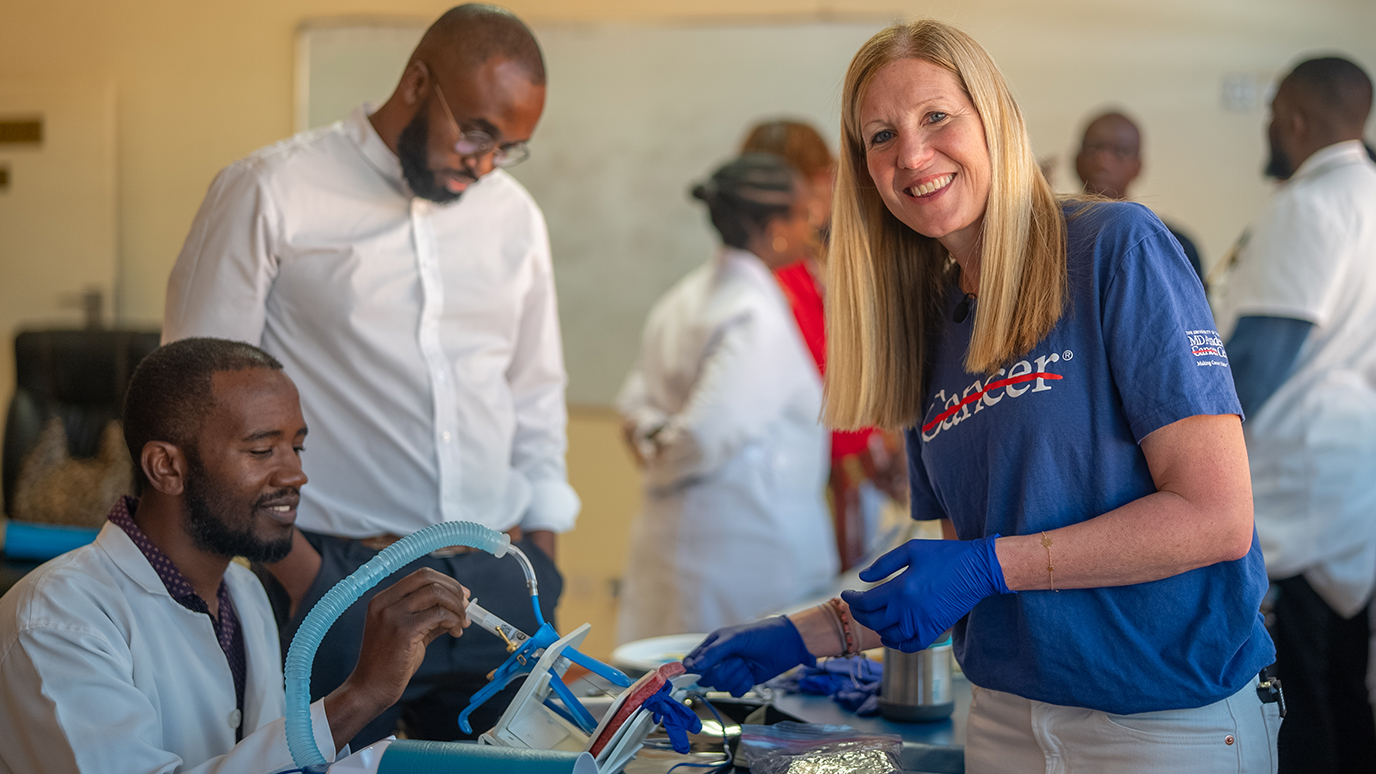- Diseases
- Acoustic Neuroma (14)
- Adrenal Gland Tumor (24)
- Anal Cancer (66)
- Anemia (2)
- Appendix Cancer (16)
- Bile Duct Cancer (28)
- Bladder Cancer (68)
- Brain Metastases (28)
- Brain Tumor (230)
- Breast Cancer (716)
- Breast Implant-Associated Anaplastic Large Cell Lymphoma (2)
- Cancer of Unknown Primary (4)
- Carcinoid Tumor (8)
- Cervical Cancer (154)
- Colon Cancer (164)
- Colorectal Cancer (110)
- Endocrine Tumor (4)
- Esophageal Cancer (42)
- Eye Cancer (36)
- Fallopian Tube Cancer (6)
- Germ Cell Tumor (4)
- Gestational Trophoblastic Disease (2)
- Head and Neck Cancer (6)
- Kidney Cancer (124)
- Leukemia (344)
- Liver Cancer (50)
- Lung Cancer (288)
- Lymphoma (284)
- Mesothelioma (14)
- Metastasis (30)
- Multiple Myeloma (98)
- Myelodysplastic Syndrome (60)
- Myeloproliferative Neoplasm (4)
- Neuroendocrine Tumors (16)
- Oral Cancer (100)
- Ovarian Cancer (170)
- Pancreatic Cancer (166)
- Parathyroid Disease (2)
- Penile Cancer (14)
- Pituitary Tumor (6)
- Prostate Cancer (144)
- Rectal Cancer (58)
- Renal Medullary Carcinoma (6)
- Salivary Gland Cancer (14)
- Sarcoma (236)
- Skin Cancer (294)
- Skull Base Tumors (56)
- Spinal Tumor (12)
- Stomach Cancer (60)
- Testicular Cancer (28)
- Throat Cancer (90)
- Thymoma (6)
- Thyroid Cancer (98)
- Tonsil Cancer (30)
- Uterine Cancer (78)
- Vaginal Cancer (14)
- Vulvar Cancer (18)
- Cancer Topic
- Adolescent and Young Adult Cancer Issues (20)
- Advance Care Planning (10)
- Biostatistics (2)
- Blood Donation (18)
- Bone Health (8)
- COVID-19 (362)
- Cancer Recurrence (120)
- Childhood Cancer Issues (120)
- Clinical Trials (624)
- Complementary Integrative Medicine (24)
- Cytogenetics (2)
- DNA Methylation (4)
- Diagnosis (230)
- Epigenetics (6)
- Fertility (62)
- Follow-up Guidelines (2)
- Health Disparities (14)
- Hereditary Cancer Syndromes (122)
- Immunology (18)
- Li-Fraumeni Syndrome (8)
- Mental Health (118)
- Molecular Diagnostics (8)
- Pain Management (62)
- Palliative Care (8)
- Pathology (10)
- Physical Therapy (18)
- Pregnancy (18)
- Prevention (892)
- Research (390)
- Second Opinion (74)
- Sexuality (16)
- Side Effects (604)
- Sleep Disorders (10)
- Stem Cell Transplantation Cellular Therapy (216)
- Support (404)
- Survivorship (322)
- Symptoms (184)
- Treatment (1772)
Breast cancer treatment at MD Anderson: 6 things that make a difference
6 minute read | Published April 26, 2021
Medically Reviewed | Last reviewed by an MD Anderson Cancer Center medical professional on April 26, 2021
If you’ve been diagnosed with breast cancer, you may already know you have many options when it comes to where to seek treatment.
But how do you determine which one is right for you? Does it depend on how close a location is to your home? The reputation of the doctor or the hospital where they work? How about access to clinical trials or the latest advances in treatment?
Wherever your priorities lie, here are six reasons to choose MD Anderson for your breast cancer treatment.
1. Individualized treatment plans, based on precise diagnoses by breast cancer experts
Whether it’s the pathologists who make or confirm your diagnosis, the radiologists who review your scans, or the surgeons who remove your tumors, MD Anderson’s physicians are leaders in the field of breast cancer. That means they’ll understand exactly what you are facing — so you can get the right treatment at the right time, based on the right diagnosis.
Every breast cancer patient who comes to MD Anderson from another facility will have their diagnosis confirmed before any type of treatment is suggested. That’s because about 25% of our patients will see a change in their diagnosis. “And even a slight adjustment to your diagnosis can affect which treatment options you’re offered first,” notes pathologist Lavinia Middleton, M.D.
As with all of our physicians, MD Anderson’s pathologists sub-specialize in particular types of cancer. That means they look at the same types of cancer all day, every day, and can recognize the nuances of different subtypes. So, no one is more qualified to review your breast tissue samples — or ensure that your diagnosis is correct before proceeding — than MD Anderson. Another benefit of coming to MD Anderson is our access to data on patient outcomes. This allows us to further refine our diagnoses over time.
2. Streamlined treatment plans and convenient locations
Your personalized breast cancer treatment plan could involve any number of therapies, including chemotherapy, surgery and radiation therapy. To make sure you receive them at the right time and in the right order, an equal number of specialists – such as a medical oncologist, a surgical oncologist and a radiation oncologist – must work together to coordinate your treatment.
MD Anderson created the Breast Multi-Team Clinic specifically to streamline that process. Available at our Texas Medical Center campus, it enables recently diagnosed, previously untreated breast cancer patients to meet with their entire care team at once and decide on a treatment plan together.
“When I left, I had so much more clarity and peace of mind,” says breast cancer survivor Dianna Ray. “I didn’t have to spend valuable time and energy coordinating between doctors’ offices and medical records and labs to get everything taken care of, and I knew my doctors were truly working together as a team. I had witnessed it myself.”
To make in-person office visits more convenient, patients can sometimes schedule their treatments or check-ups at one of MD Anderson’s locations around the Greater Houston area.
“I liked that I didn't have to deal with Houston traffic when I drove to MD Anderson League City,” notes Lauren Graves of her breast cancer treatment experience. “It was also easier to navigate and less crowded, and there’s free parking.”
3. Dedicated teams for breast cancer subtypes
MD Anderson has specialists dedicated to specific types of breast cancer, such as triple-negative, inflammatory, and those related to inheritable genetic mutations. And, because our physicians see thousands of these cases each year, they can offer treatment plans for even the rarest types of breast cancer with a high level of confidence.
“Where you go first makes a big difference,” says Wendy Woodward, M.D., Ph.D. “So, it’s important to go to a large, comprehensive cancer center like MD Anderson. We are the experts.”
4. Access to clinical trials, latest advances
Our highly coordinated team approach — in which specialists from multiple areas come together to formulate and agree upon a plan — is a hallmark of MD Anderson, and the norm for every patient who comes here.
But MD Anderson is also known for its cutting-edge research and extensive clinical trial program. Both routinely contribute tangible improvements to the diagnosis and treatment of breast cancer. They also give our patients access to experimental drugs, innovative surgical techniques and new therapies before they become more widely available.
“I was thrilled to be offered a clinical trial,” says Kelly Agent, who took part in a new targeted therapy study through our Breast Cancer Moon Shot®. “I’m elated to see what this cutting-edge drug has done for me and what it’s going to do for other people.”
Lori Shults, who took part in an immunotherapy clinical trial through that same program, agrees.
“Once I realized I’d be getting what everyone else got, plus something extra if the conventional treatment didn’t work, I didn’t see a downside to it,” she says.
5. Recommendations that come with choices
Having a choice is important when it comes to deciding on treatment. Because every patient is unique, so what suits someone else perfectly might not work as well for you.
Lisa Tecklenburg, for instance, was a single, 35-year-old endurance athlete when she was diagnosed in 2016. So, safeguarding her fertility and ability to compete were paramount.
“My doctors took my age, lifestyle and goals into account, and developed a plan that fit me perfectly,” she said. “And while it included some standard treatments, the details were tailored to me.”
Sarah Hosea was also grateful to be offered options – along with a recommendation grounded in science that helped her make a well-informed treatment decision.
“My doctors recommended the clinical trial I ended up joining,” she says. “But they also made it clear that the decision was mine. I really liked that they gave me a choice. And it was comforting to know that I could have chosen a different treatment option if I’d wanted to.”
6. A team approach to cancer care
When you receive cancer treatment, it’s important to consider its potential impact on any chronic health conditions you might have, such as diabetes or hypertension. In fact, cancer treatment is most likely to be successful when your care team manages the cancer in close collaboration with physicians who specialize in chronic health conditions among cancer patients.
Nicole Love’s history of cardiomyopathy, for instance, required special consideration during her mastectomy and subsequent breast reconstruction. “A weakening of the heart muscle can make general anesthesia riskier,” she explains. “So, I’d done my best to avoid having surgery.”
Nicole felt much less anxious after consulting with one of MD Anderson’s cardiologists, who worked closely with her surgeons and anesthesiologist to ensure that the procedure went smoothly.
“Heart disease is a very prevalent in my family,” Nicole says. “So, it was important that I feel confident in my team’s ability to work around that issue. The level of care I received at MD Anderson was simply amazing.”
No matter what your particular situation is, our physicians will work with you to create a personalized and compassionate care plan that will meet your treatment goals.
Request an appointment at MD Anderson online or by calling 1-844-451-1610.

The level of care I received at MD Anderson was simply amazing.
Nicole Love
Survivor





